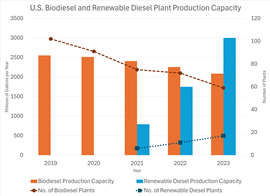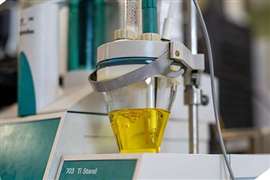Read this article in Français Deutsch Italiano Português Español
Chevron REG indefinitely shutting two Midwest biodiesel plants
13 March 2024
The company blamed poor market conditions related to EPA renewable fuel targets for the closure of plants in Ralston, Iowa, and DeForest, Wis.
A March 4 article in the Carroll (Iowa) Times Herald reported that Chevron Renewable Energy Group (REG) is indefinitely shutting down two Midwest biodiesel production facilities — one in Ralston, Iowa and another in DeForest, Wis. In the story, Neville Fernandes, a vice president with Chevron REG, blamed poor market conditions for the closures, which will affect a total of 50 employees.
 Graph: KHL Staff. Data: U.S. Energy Information Administration
Graph: KHL Staff. Data: U.S. Energy Information Administration
In a March 1 article in the Des Moines Register, Fernandes said both facilities have been out of operation since December. Brian Coker, plant manager for the DeForest facility, said in a LinkedIn post that the last day for employees at the plant will be April 12. A Chevron REG spokesperson said both plants “will be safely and methodically closed over the next few weeks in compliance with federal, state and local regulations.”
The DeForest facility is the only biodiesel production facility in Wisconsin, according to the most recent data from the U.S. Energy Information Administration (EIA), which is dated Aug. 7, 2023. With the Ralston closure, EIA data indicates Iowa will still have 10 production facilities — the largest number in the U.S.
In the Des Moines Register story, Fernandes said if the company’s profit margins improve, there is a possibility the plants will reopen.
On June 21, 2023, the U.S. Environmental Protection Agency (EPA) announced its final rule under the Renewable Fuel Standard (RFS) program establishing biofuel volume requirements from 2023 to 2025. For 2024 and 2025, volume targets for biomass-based diesel — which includes biodiesel and renewable diesel — were 3.04 and 3.35 billion gallons respectively.
Some groups, such as the Diesel Technology Forum (DTF), expressed disappointment at the volume requirements. Power Progress reported that DTF Executive Director Allen Schaeffer called the 2023 targets, which for biomass-based diesel were 2.82 billion gallons, “misaligned with current conditions.” It also cited Kurt Kovarik, vice president of federal affairs for Clean Fuels Alliance America, as saying, “EPA is undercutting the certainty that our industry hoped for from a three-year RFS rule.”
A June 22, 2023, story by the Des Moines Register said EPA “took into account production estimates. But the agency said actual production has consistently fallen short of capacity.”
EIA biodiesel plant production capacity data, which biodiesel producers are required to submit to EIA, shows a decline from 102 plants and 2.55 billion gal/year on Jan. 1, 2019 to 59 plants and 2.09 billion gal/year on Jan. 1, 2023. In February 2023, EIA also estimated that production capacity for renewable diesel, which unlike biodiesel is chemically equivalent to petroleum diesel, could reach as much as 5.9 billion gal/year by the end of 2025. Additionally, the EIA announced in in September 2023 that renewable diesel production capacity in the U.S. exceeded biodiesel for the first time.
EIA data showed Chevron REG as one of 48 producers of biodiesel in the United States. It is one of four with multiple locations. Excluding the Ralston and DeForest locations, Chevron REG has seven production locations in the U.S. The company has two locations in Germany. Based upon Chevron’s data (EIA data does not include the company’s Geismar, La., plant), total nameplate capacity for the remaining facilities in the U.S. is 370 million gal/year, or approximately 18 percent of 2023 U.S. production capacity as reported by EIA.
POWER SOURCING GUIDE
The trusted reference and buyer’s guide for 83 years
The original “desktop search engine,” guiding nearly 10,000 users in more than 90 countries it is the primary reference for specifications and details on all the components that go into engine systems.
Visit Now
STAY CONNECTED




Receive the information you need when you need it through our world-leading magazines, newsletters and daily briefings.
CONNECT WITH THE TEAM















